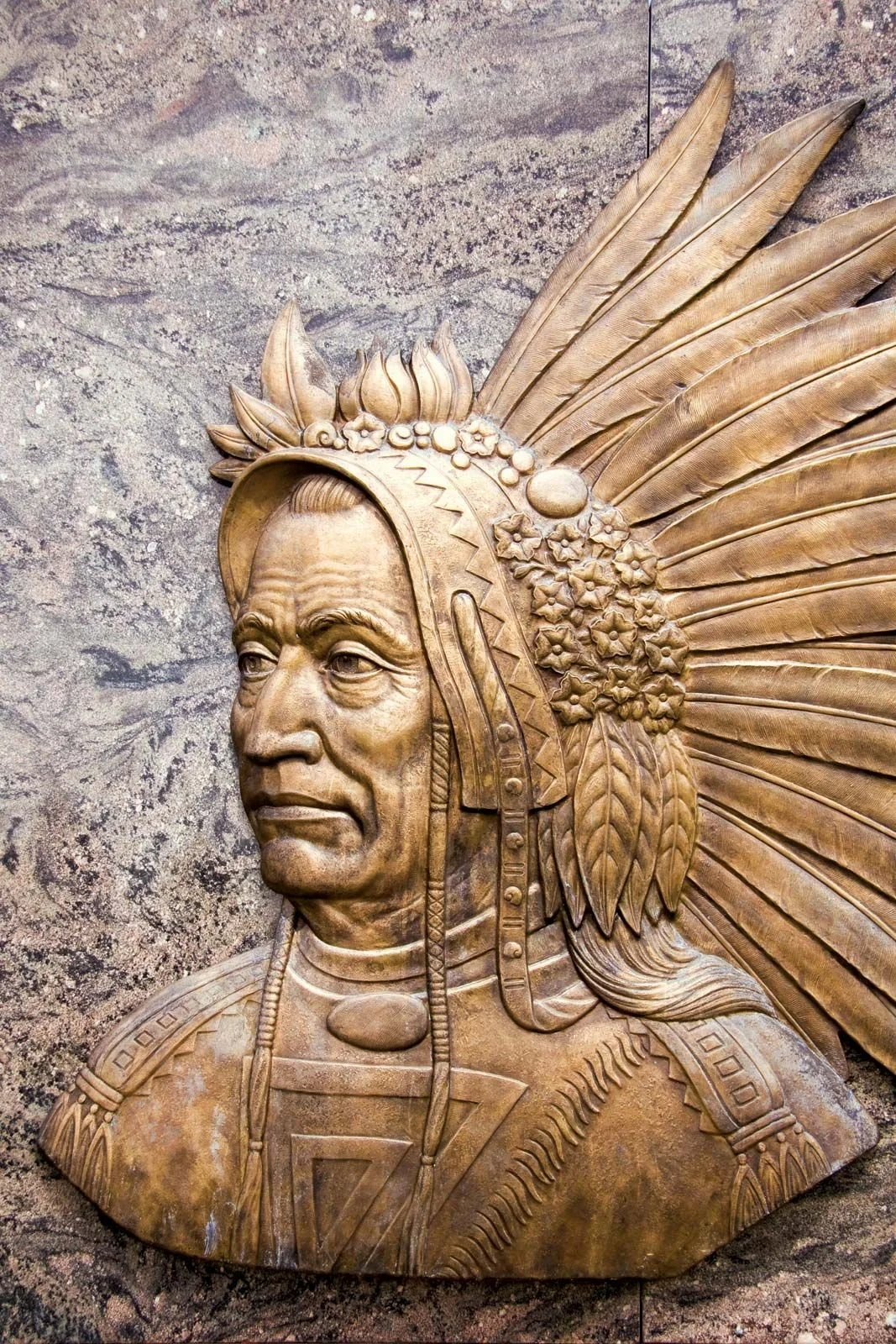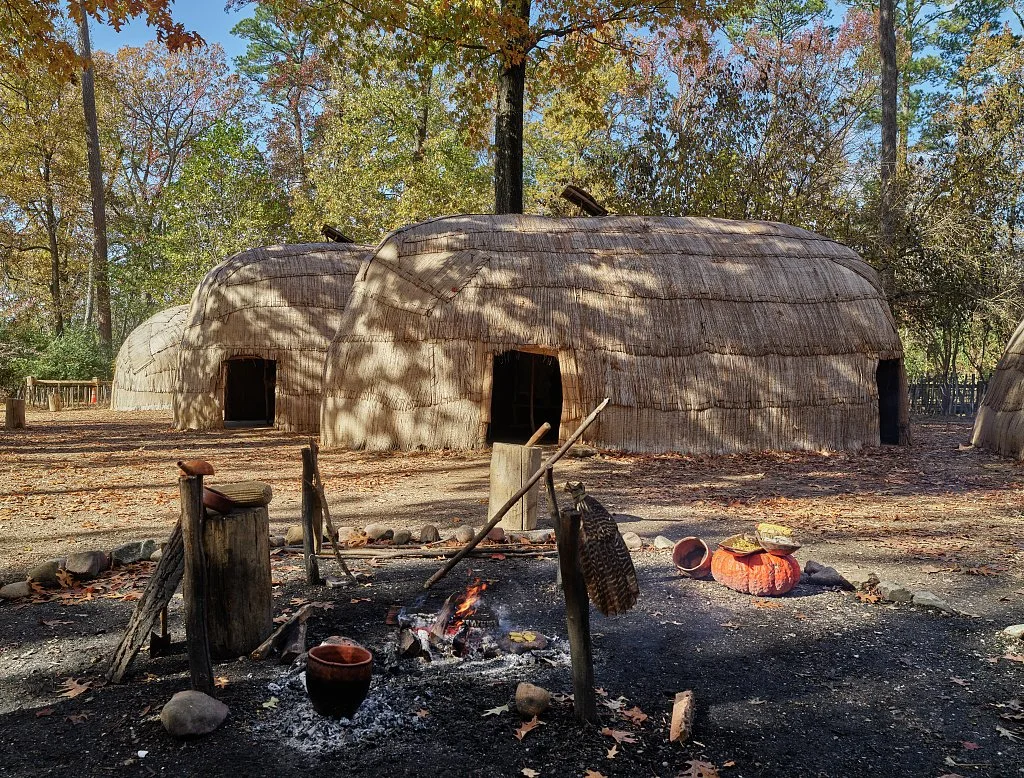Chief Powhatan: A Legacy of Diplomacy and Sovereignty
As a descendant of Wahunsenacawh (Chief Powhatan), I’m honoring his legacy on Indigenous Peoples’ Day: his governance of the Powhatan Confederacy, his diplomatic clarity with the Jamestown colonists, and his enduring ethic: choose love and reciprocity over force.
Portrait of Wahunsenacawh
Wahunsenacawh, known as Chief Powhatan, whose steady leadership shaped early Virginia. Image courtesy of Encyclopedia Britannica (used non-commercially).
On Indigenous Peoples’ Day, I honor my ancestor Wahunsenacawh, known as Chief Powhatan — a leader navigating encounters with a different culture, coercion, and new possibilities. He ruled from Werowocomoco, in a landscape woven with rivers, forests, and communities whose memory survives. As paramount chief, he inherited a small network of allied towns and built the Powhatan Confederacy of nearly thirty tribes, integrating diplomacy, tribute, and internal governance under his leadership.
When the English stumbled into Jamestown in 1607, they were hungry, underprepared, and alien to the land. Powhatan faced a choice. He chose to open communication. In early 1608, at a moment of acute scarcity, his people provided food to the struggling settlers, helping to keep them alive. But even in giving, he asserted dignity and demand. He refused colonial overtures to kneel in subservience. These travelers came upon their land, and they needed help. The Powhatan Confederacy was not subservient, especially when serving to keep the travelers alive, but in any matter, regardless.
In other words, he would not sacrifice sovereignty for show.
In one of his most striking recorded speeches to Captain John Smith, Powhatan asked:
“What will it avail you to take by force that from us which you may have by love? Or to destroy them that provide you with food? What can you get by war, when we can hide our provisions and fly to the woods?”
(source: Library of Congress transcription of John Smith’s The Generall Historie of Virginia)
The first time I learned of these words, they struck my heart. They hold enduring moral clarity and ecological truth: injure the giver, and you injure yourself. This is a lesson needing relearning through centuries of diplomacy and personal negotiations. Though its wisdom is its allowance, will humanity ever uphold such truths?
Over the years, tensions escalated into war. In 1609, the First Anglo-Powhatan War began, and the winter of 1609-10 became known as the Starving Time, when Jamestown settlers, cut off from Indigenous networks, nearly perished. Yet even amid siege, Powhatan negotiated, withheld, and maneuvered. Chief Powhatan was always aware that his people bore both the burden and the right of the land. He allowed the marriage of his daughter, Pocahontas, to John Rolfe in 1614 as a gesture toward peace, though he never ceded his authority.
When he died in 1618, his mantle passed to his brothers and successors, but his moral sentence endures: choose love over taking by violence. Today, I celebrate his gifts: governance that knit communities together, diplomacy that tried to turn strangers into neighbors, and an ethic that still asks us to meet one another with respect and reciprocity.
Powhatan Heritage
Reconstructed Yehakĭn huts of the Powhatan Indian Village, Jamestown Settlement. Photo: Carol M. Highsmith / Library of Congress (public domain).
Learn More & Support Indigenous Heritage
Pamunkey Indian Tribe & Museum — direct descendants maintaining Powhatan heritage.
Mattaponi Indian Tribe — preserving cultural traditions and education.
Rappahannock Tribe — active in land repatriation and community programs.
Werowocomoco National Park Service Site — archaeological and cultural education on Powhatan’s capital.
Timeline: Wahunsenacawh (Chief Powhatan)
| Year / Approx | Event / Action |
|---|---|
| c.1545–1550 | Birth of Wahunsenacawh; later consolidates leadership beyond inherited towns, building a broader chiefdom in Tsenacomoco. |
| by 1607 | The Powhatan Confederacy unites ~30 Algonquian-speaking tribes under his paramountcy. |
| Dec 1607 | Captain John Smith is captured and brought to Werowocomoco, Powhatan’s capital. |
| Early 1608 | At a moment of scarcity, Powhatan’s people provide food to the settlers; diplomacy continues. |
| 1608 | Powhatan’s recorded admonition to John Smith: “What will it avail you to take by force…” |
| 1609–1614 | First Anglo-Powhatan War; Jamestown’s “Starving Time” occurs in 1609–10. |
| 1614 | Marriage of Pocahontas and John Rolfe, ushering in a tenuous peace. |
| 1618 | Death of Powhatan; his political architecture and legacy continue through successors of the Confederacy. |



